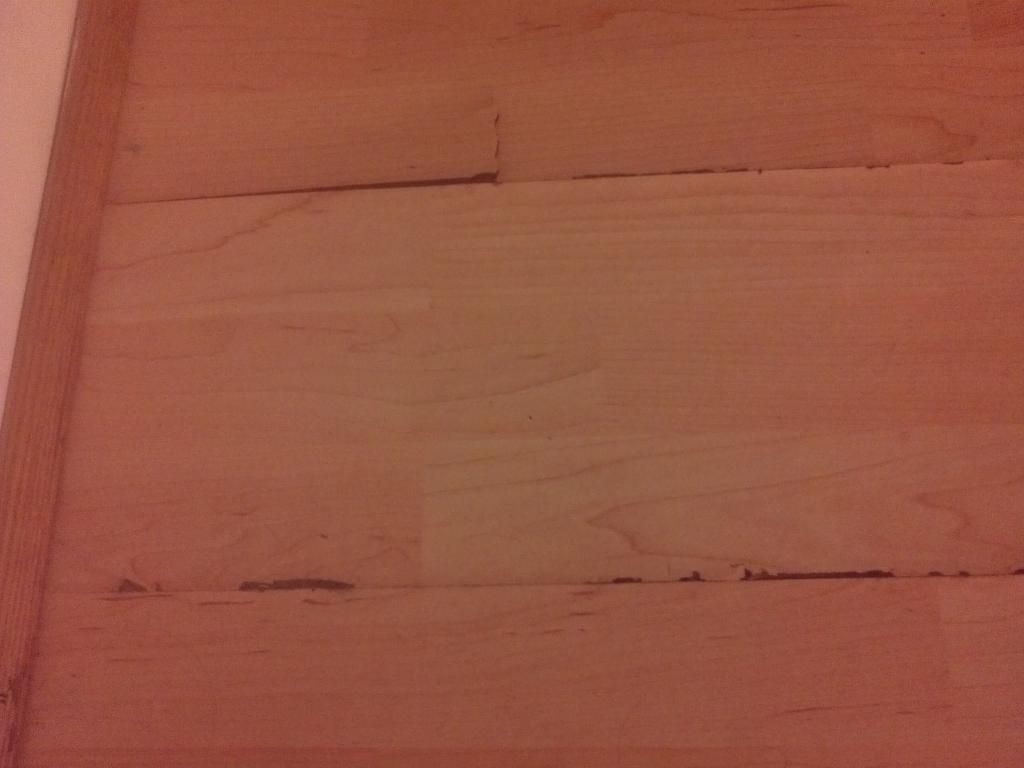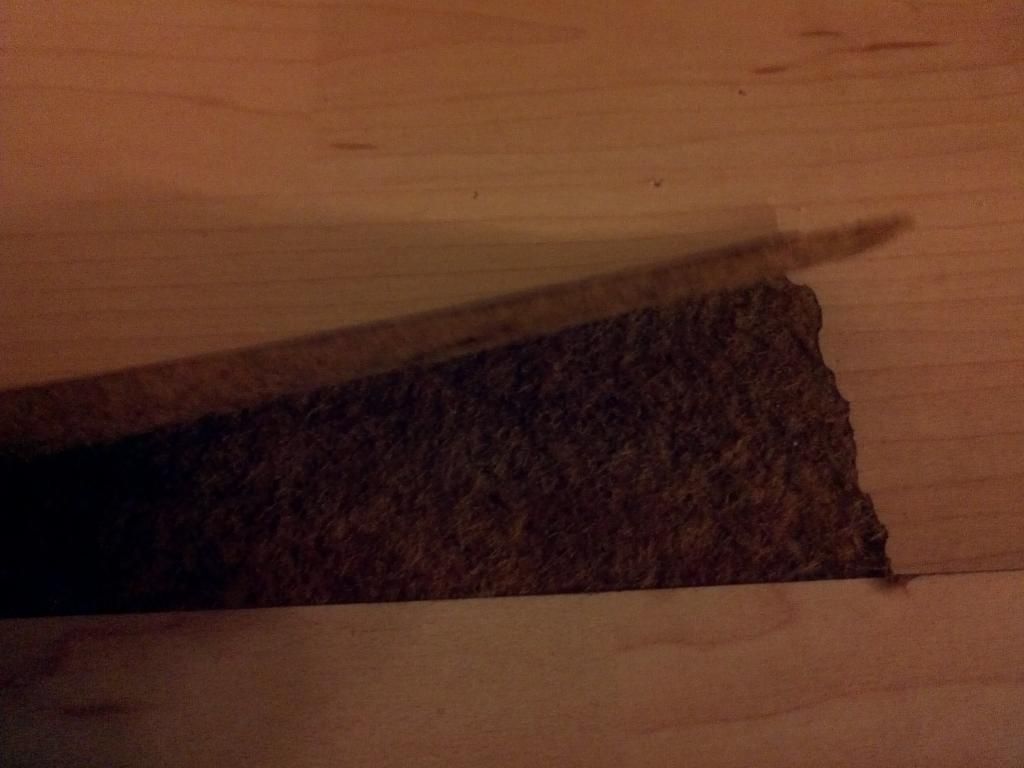The new forums will be named Coin Return (based on the most recent vote)! You can check on the status and timeline of the transition to the new forums here.
The Guiding Principles and New Rules document is now in effect.
Laminate floor behind dishwasher buckling -- update: replaced dishwasher, still leaking
Vi Monks Registered User regular
Registered User regular
 Registered User regular
Registered User regular
For the past few months, I've been having a problem with my floors (and a possibly related dishwasher issue, but I'll get to that). I have an interior wall that separates my kitchen from my living room. The dishwasher is up against this interior wall, and on the living room side, exactly behind the dishwasher, the laminate flooring has started to buckle (I think that's the term, anyway -- pictures are posted below). The affected areas started small but have been growing over the past couple months, with the buckling getting more pronounced. While cleaning, I accidentally peeled the top layer of laminate away, and the pulpy wood stuff underneath is noticeably damp.
As for the dishwasher, it has been making a sort of grinding noise about halfway through the cycle. The noise itself is cyclical -- it starts up, grows in volume for a second or two, then recedes, then starts up again a couple seconds later. As far as I've been able to tell, it still functions properly. Dishes still get clean, water drains promptly, etc. Some quick googling suggests that the dishwasher is leaking, and it's somehow getting underneath the floor, but I wanted to post here to see what you guys think. I'm definitely no expert when it comes to home repairs.
Here are the pictures of the floor. You can see that the top layer of the laminate has started to chip away at the seams, which are noticeably bulging. The second picture is of the part of the laminate that I accidentally peeled away and the wet wood underneath.


As for the dishwasher, it has been making a sort of grinding noise about halfway through the cycle. The noise itself is cyclical -- it starts up, grows in volume for a second or two, then recedes, then starts up again a couple seconds later. As far as I've been able to tell, it still functions properly. Dishes still get clean, water drains promptly, etc. Some quick googling suggests that the dishwasher is leaking, and it's somehow getting underneath the floor, but I wanted to post here to see what you guys think. I'm definitely no expert when it comes to home repairs.
Here are the pictures of the floor. You can see that the top layer of the laminate has started to chip away at the seams, which are noticeably bulging. The second picture is of the part of the laminate that I accidentally peeled away and the wet wood underneath.


Vi Monks on
0
Posts
If you're lucky, the leak involves gaskets below the dishwasher, you can remove the bottom... water spinny thing... and heating element to get in there. Otherwise, time to pull that dishwasher out.
Pull it out of its alcove and see how wet the floor is under the dishwasher. Look around and at the bottom of the dishwasher to see if you can find where the leak is coming from. It's possible that it's a hose / clamp or a seal that you can easily replace.
Once you pull out the dishwasher, you've got a bit of an issue with the floors. If you can find and stop the leak, dry out the area where you keep your dishwasher using towels and maybe a hair dryer. Go to Lowes, and get one of the desiccants that they sell - Damp Rid or something. It's a refillable cup that will absorb water and drip it into a larger container below. That should help dry out the area, check to make sure you don't have mold.
As for the floor, if you catch it in time you might be able to live with it. If it's not too bad, can you put a rug or furniture over the bad spot? You might be able to replace just that spot, if you have wood left from when the floor was installed, or can match closely. I haven't had much luck replacing wood but it's probably something you can hire someone to do for a reasonable price, if it's just that spot.
I did find a few places that sell 6mm laminate online, but they either have obscenely high shipping costs or require a few hundred square feet minimum. Anyone know of a good place where I can find just a few pieces of 6mm laminate? Redoing the floors completely is not really an option right now, unfortunately.
Edit: If I fix the leaking dishwasher, would I do any long term damage if I just left the messed up laminate there for a year or so? If I saved up for a while, I could probably afford to redo the floors completely.
I'd be surprised if you can get someone to come out and check on your dishwasher for free, try and just get an estimate for a motor / replacement over the phone and see if it's worth just replacing it. Between a leak and a bad motor, I'd probably lean towards replacement over repair.
Yeah, I'm also leaning towards replacement at this point. I'm getting quotes of $200-250+ for a new motor and installation. And I believe the dishwasher is a few years old now anyway (though it was here when we moved in, so I don't know exactly).
You won't harm anything by leaving the damaged laminate there for as long as it takes you to get around to repairing it or replacing the floor.
Good point. Thanks, will give that a shot.
If you pull the washing machine out a bit, you should be able to see if it's wet around / behind it.
If the leak is in the wall, it's possible that a pipe is leaking near a wet spot, but it's also quite possible the leak is a ways down from the spot you can see and water is running in that direction.
What I would do (after making sure the leak isn't outside the wall) is cut a small hole in the drywall near the floor behind where your washer is. Get in there with a flashlight and see if it's wet / you can see the leak. Patching a small drywall hole isn't difficult, and you can also get an access panel at Lowes / Home Depot for ~$10 that will pop into a hole in drywall and cover it up.
If that's not wet, move down to where it's wettest and try to do the same thing. Cut on the side of the wall that's least visible, and see if it's dripping / running down the studs, if the bottom joist is wet, etc. Most likely you are going to need to hire a plumber and tear out some drywall anyway, but still try to keep your cuts small in case it's something you can fix easily.
If you have a basement and can get directly under the leaking spot, try to see if the wood is wet and where it's wet. That might be able to help show you where the leak starts and is running to / from.
That's certainly possible, but if so, the connection must be inside the wall somewhere. I've already looked at all the connections behind the washing machine. No water behind it, on the wall where the connections are, or underneath.
@zagdrob
I may try that before paying to have any work done, though I did just call a plumber (on a recommendation from a few neighbors) who is willing to come out tomorrow and give me a free estimate, so I figure I'll let him do his thing before I start cutting holes in things, even if he'll have to cut the wall open to see what's wrong anyway. Thanks for the suggestions though. If I don't like the quote the plumber gives me, I'll open things up and have a look.